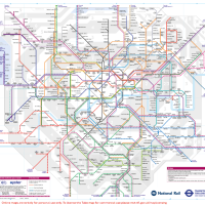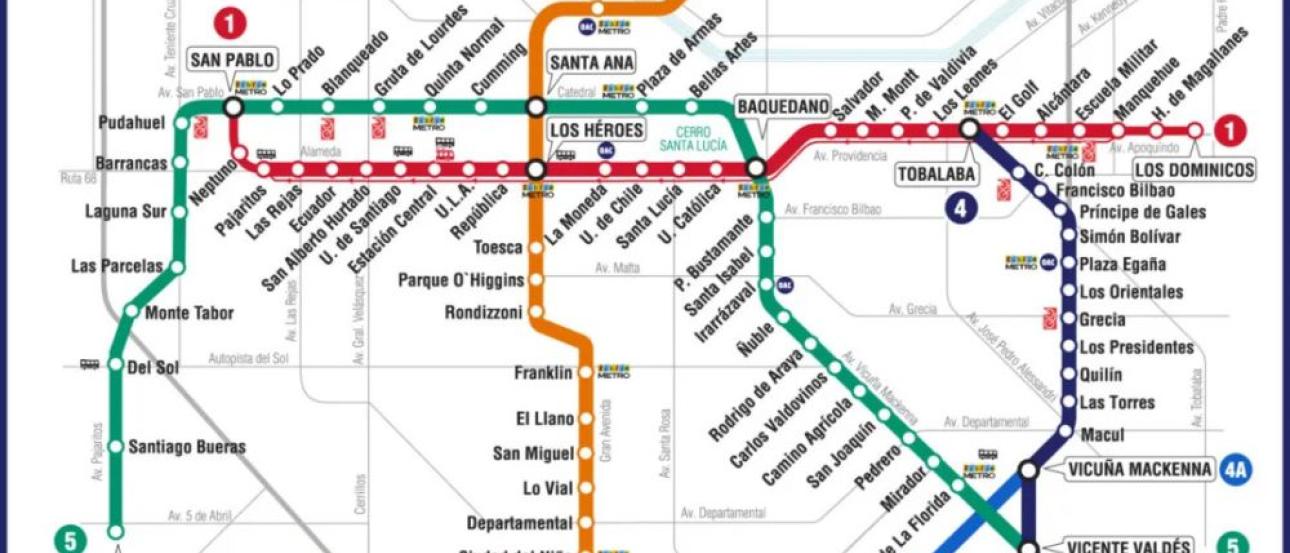I neglected to include this in my summary of myself, but I am a person who has a deep appreciation for public transportation systems—quality public transportation systems, but I hope that's given. Public transportation where I grew up in Cleveland, Ohio allowed me to go from where I lived, on the West Side, all the way to the East Side when I went to visit family friends. The system there is massively smaller than the one in the city I now call home, and the one in Chicago is embarrassing at times compared to the system here in Santiago.
First off, I want to establish that the Cleveland Rapid Transit Association is well known in the States for being pretty efficient for a midsize city such as Cleveland. The system in Chicago is called the ´L´ for being ´elevated´ in the air, and is famous for this reason. I've been fortunate enough to experience New York City public transportation as well. Their system also pales in comparison to that in Santiago. London as well, a city famous for its public transportation, is lacking in comparison to the capital of Chile, for more than one reason. Allow me to explain.
The price of the metro (subway) in Chile varies very slightly depending on a schedule of peak hours, off peak hours, and super off peak hours. The highest price, no matter what distance you´re traveling on the metro, is $800 chilean pesos, which comes out to around $0.86—less than a single U.S. dollar. By comparison, Chicago´s CTA charges a flat rate of $2.50, and London´s fares are measured by how long you´re on the Tube/how much distance you travel. They call it ¨pay as you go,¨ and depending on your status as a rider such as student, apprentice, and various age-based groups, there are caps for the total amount you would have to pay daily no matter how far you go.
On the other hand, London´s subway system is massively more accessible and has almost four times as many stations as Santiago. If I´m being honest, I can´t remember much about wait times in London besides one time when we went further out and had to wait long enough for me to walk up and down the platform a few times. Here in Santiago, I have never had to wait longer than 5 minutes—the same can be said of New York. Chicago definitely has longer wait times, and suffers often from delays and trains so full that you can´t even shove in to try and get to your destination. I will say that the same can be said sometimes about Santiago with its metros and micros (buses).
The famous phrase ¨mind the gap¨ is very literal; please, if you are using the metro in London, MIND THE GAP. This is coming from someone who got their foot caught in one of these famous gaps. I was genuinely scared for a second that the train was going to start and there I´d be. Fortunately, my sister was able to help me get unstuck, but that is a serious problem! I can't even imagine the difficulties faced by wheelchair users with these systems—and a city with a population of 9.5 million certainly has many of them. A simple issue of poor or old transportation infrastructure could be used when talking about New York too, with its stations flooding when it rains. This is another circumstance where Santiago is superior; most stations are clean, have various art installations, perfectly fit their trains—almost no gaps—, have electronic screens with entertainment information and accurate updates concerning when trains will arrive, and every single one I have been in so far has been accessible. Chicago has information about which stations are not accessible, but there is not an insignificant number of stations without access.
¨What is it with you and the metro?¨ Well, public transportation is an important resource and vital in connecting people to their jobs, their friends, their social events—it is a basic resource that is environmentally friendly in a way that every family having a car will never be. Our dependence on oil in the United States has translated to a dependence on cars, and because of this, our train systems are not well maintained. The country in general is completely behind in terms of research and focus on public transportation: our trains are slow, our stations are ugly, and our systems are small. Other countries, such as Chile, make it painfully obvious how much better we could be doing.




Maggie Peyton
My name is Maggie and I'm from Chicago, Illinois (one of the best cities in the States in my completely unbiased opinion). I'm left-handed, could watch Encanto every day, and I am a huge fan of the singer-songwriter Mitski. I study Public Policy at the University of Illinois in Chicago and am excited to learn more about Santiago. I hope to find a community away from the one I have at home and make Santiago my own.












